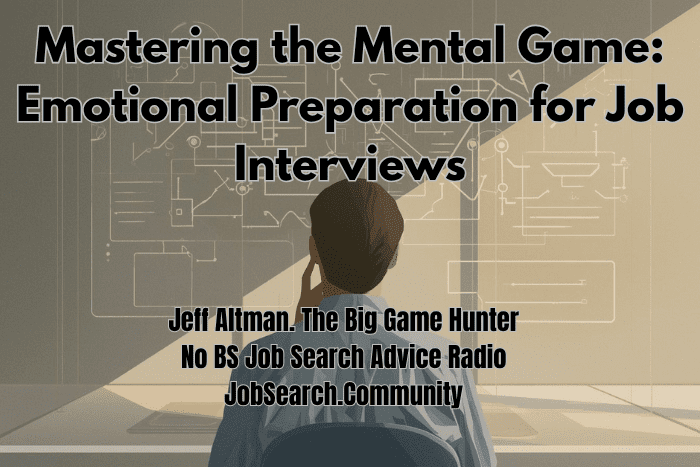By Jeff Altman, The Big Game Hunter
Job interviews can be intimidating experiences that test not only your professional qualifications but also your ability to manage stress and present yourself confidently under pressure. While most people spend considerable time researching the company and rehearsing answers to common questions, many overlook a crucial component of interview success: emotional and mental preparation. Understanding how to manage your psychological state before and during an interview can make the difference between appearing as a composed, competent candidate and coming across as uncertain or overwhelmed.
Understanding Interview Anxiety
First, it’s important to recognize that feeling anxious before a job interview is completely normal. In fact, it’s virtually universal. Whether you’re a recent graduate attending your first professional interview or a seasoned executive meeting with a new potential employer, some degree of nervousness is to be expected. This anxiety stems from our natural response to high-stakes situations where we’re being evaluated and judged.
The key insight here is that not all nervousness is detrimental. A moderate level of anxiety actually serves a beneficial purpose by heightening your alertness, sharpening your focus, and giving you the energy needed to perform at your best. Think of it as your body’s way of ensuring you’re fully engaged and prepared to rise to the challenge. The problems only arise when anxiety becomes excessive and begins to interfere with your ability to think clearly and communicate effectively.
The Physical Impact of Stress
When anxiety levels escalate, your body responds in predictable ways. One of the most common physiological responses is altered breathing patterns. People experiencing high stress or anxiety tend to take rapid, shallow breaths that only fill the upper portion of their lungs. This restricted breathing actually perpetuates the stress response, creating a cycle where physical tension increases mental anxiety, which in turn causes more physical tension.
Understanding this connection between breathing and emotional state gives you a powerful tool for managing interview stress. Before your interview, take a few moments to focus deliberately on your breathing pattern. Rather than the quick, shallow breaths that accompany anxiety, practice breathing deeply and slowly, allowing air to fill your lungs completely and expand your abdomen. This diaphragmatic breathing activates your body’s relaxation response, counteracting the stress signals and helping you achieve a calmer state.
Progressive Relaxation Techniques
Beyond breathing exercises, another effective strategy involves systematic muscle relaxation. Tension tends to accumulate in our bodies without us fully realizing it, particularly in our shoulders, neck, jaw, and forehead. This physical tension contributes to feelings of stress and discomfort.
Try this approach: Starting with your feet, consciously release any tension you’re holding. Gradually work your way up through your calves, thighs, hips, abdomen, chest, arms, shoulders, neck, face, and finally to the crown of your head. With each body part, notice where you’re holding tension and intentionally let it go. This progressive relaxation technique, combined with deep breathing, can significantly reduce physical manifestations of stress and help you feel more grounded and present.
The Power of Visualization
Mental rehearsal, or visualization, is another powerful technique used by successful people across many fields, from professional athletes to performing artists. The principle is straightforward: by mentally practicing a successful outcome, you prepare your mind to execute that outcome in reality.
Find a quiet space where you won’t be disturbed (naturally, not while driving or in situations requiring your attention). Close your eyes and create a detailed mental picture of your interview going well. Visualize yourself arriving at the office feeling confident and prepared. Imagine sitting across from the interviewer, maintaining good eye contact, speaking clearly and thoughtfully, and handling questions with poise. Picture the interviewer responding positively to your answers, nodding in agreement, and engaging enthusiastically with your ideas. Finally, envision the interview concluding on a positive note, with a firm handshake and warm expressions of mutual interest.
positively to your answers, nodding in agreement, and engaging enthusiastically with your ideas. Finally, envision the interview concluding on a positive note, with a firm handshake and warm expressions of mutual interest.
This mental rehearsal serves multiple purposes. It familiarizes your mind with the experience of success, reducing the fear of the unknown. It also helps you identify the specific behaviors and attitudes you want to embody during the actual interview. When the real moment arrives, your brain will recognize elements you’ve already “practiced,” making it easier to access that composed, confident state.
Embracing the Learning Process
Finally, it’s crucial to maintain a healthy perspective on any single interview. Not every interview will result in a job offer, and that’s perfectly acceptable. Each interview experience, regardless of the outcome, provides valuable practice and learning opportunities. You might discover questions you hadn’t anticipated, realize areas where your responses could be stronger, or gain insights into how different company cultures conduct their hiring processes.
Rather than viewing an unsuccessful interview as a failure, reframe it as a rehearsal for future success. Every conversation helps you refine your presentation, build confidence, and better understand what employers are seeking. With this growth mindset, each interview becomes a stepping stone toward your ultimate career goals rather than a make-or-break moment.
Conclusion
Emotional preparation for job interviews deserves as much attention as researching the company or planning your outfit. By managing your breathing, releasing physical tension, visualizing success, and maintaining perspective on the process, you can transform nervous energy into confident presence. These techniques won’t eliminate all anxiety—nor should they—but they will help you harness that energy productively, allowing your qualifications and personality to shine through during your interview.
Ⓒ The Big Game Hunter, Inc., Asheville, NC 2025
The Big Career Management Lessons from The Shawshank Redemption
ABOUT JEFF ALTMAN, THE BIG GAME HUNTER
People hire Jeff Altman, The Big Game Hunter to provide No BS Career Advice globally because he makes many things in peoples’ careers easier. Those things can involve job search, hiring more effectively, managing and leading better, career transition, as well as advice about resolving workplace issues. He is the producer and former host of “No BS Job Search Advice Radio,” the #1 podcast in iTunes for job search with over 3000 episodes.
The Interview Mistake Too Many Executives Make (And How To Correct It)
You will find great info to help with your job search at my new site, JobSearch.Community Besides the video courses, books and guides, I answer questions from members daily about their job search. Leave job search questions and I will respond daily. Become an Insider+ member and you get everything you’d get as an Insider PLUS you can get me on Zoom calls to get questions answered. Become an Insider Premium member and we do individual and group coaching.
answer questions from members daily about their job search. Leave job search questions and I will respond daily. Become an Insider+ member and you get everything you’d get as an Insider PLUS you can get me on Zoom calls to get questions answered. Become an Insider Premium member and we do individual and group coaching.
38 Deadly Interview Mistakes to Avoid
Schedule a discovery call at my website, www.TheBigGameHunter.us to discuss one-on-one or group coaching with me
LinkedIn: https://www.linkedin.com/in/TheBigGameHunter
Resume & LinkedIn Profile critiqueswww.TheBigGameHunter.us/critiques
What Companies Look for When Choosing a Board Member
We grant permission for this post and others to be used on your website as long as a backlink is included to www.TheBigGameHunter.us and notice is provided that it is provided by Jeff Altman, The Big Game Hunter as an author or creator. Not acknowledging his work or providing a backlink to www.TheBigGameHunter.us makes you subject to a $1000 penalty which you proactively agree to pay.

